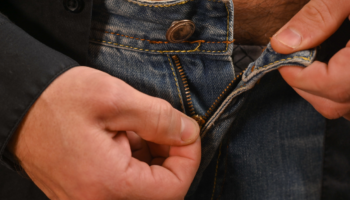Endometriosis drove a wedge right between me and my soon-to-be-husband. Before my official endometriosis diagnosis, I couldn’t bear the thought of sex—let alone masturbation. Instead of reaching out for help or communicating this pain to my partner, I kept my mouth shut and "dealt" with it. That silence eventually turned into resentment and I regularly thought about how much I hated him for using me (and for acting oblivious to what was going on). But, how could he know? I hadn’t said a word.
My silence eventually led to a disconnect — I became physically and emotionally unavailable, to him and to myself. I didn’t want to believe that I was “broken,” so instead of dealing with the issue head-on, I ignored it. Until one day, I snapped. I had a complete breakdown; sobbing, I told my partner every gut-wrenching detail, from lying in the fetal position on the shower floor to fuming with rage while he slept next to me.
Opening that line of communication was the first step to getting my life and my relationship back to where they needed to be. My diagnosis led to the validation I needed to accept that this may be an issue that I’ll have to deal with for the rest of my life and that acceptance taught me how to be an advocate for myself and for others.
What Is Endometriosis?
Endometriosis is a chronic, inflammatory condition in which endometrial-like tissue grows outside of the uterus. This tissue can grow literally anywhere in the body, including a person’s ovaries, fallopian tubes, and the lining of their pelvis.
Endometriosis can also grow within the bladder, bowel, and rectum, among other areas of the body. The only place endometriosis hasn’t been found is the spleen.
Endometriosis lesions grow only to break down during menstruation. But, because this tissue isn’t within the uterus, it has no way for it to escape. This trapped tissue then becomes inflamed, causing scars, cysts, adhesions, and a lot of pain.
If this tissue grows behind the vagina or becomes stuck between the vagina and the front of the rectum, penetration can pull or stretch it—which can be extremely painful. There are ways, however, to manage the pain and repair your relationship to sex. And, you may want to brace yourself for this: Sometimes, this reunion (between you and your sex life) starts with the OG form of self-love: masturbation.
Take Charge of Your Sex Life
In celebration of Masturbation Month, I’ve created the ultimate masturbation guide for people with endometriosis. In it, you’ll learn how to fall in love with yourself all over again, have an orgasm sans pain, and take charge of your sex life. This may seem like an outlandish claim, but trust me—I’m living proof that there is hope for your sexual independence. I also included advice from some of my favorite experts in the sexual health and wellness space.
Read: 8 Tips for Having the Best Masturbation Month Ever!
Be Open and Honest
Being open and honest with yourself and your partner is a great first step to take to get things back on track. This means paying attention to your pain points (i.e. vaginal penetration) and then discussing those issues with your partner and your doctor.
“Whether it’s solo or partner sex, you can improve your sex life by being open and honest,” says Megwyn White, a certified clinical sexologist and the Director of Education at Satisfyer. “It’s also important to be in constant communication with your doctor if you’re experiencing changing symptoms during sex or masturbation.”Living with endometriosis can leave you feeling broken, sometimes in more ways than one. It’s important to remember that you have a right to sexual pleasure, too. Once you’ve made that realization, you’ll be able to create a pain management and intimacy plan that works for you.
“Sex with endometriosis can be incredibly painful and can lead to a disconnection between self, pleasure, and sex,” says Kate Balestrieri, a licensed psychologist, certified sex therapist, certified sex addiction therapist, and Founder of Modern Intimacy. “There is an element of powerlessness that often accompanies endometriosis and the pain that can accompany sex as a result. To reconnect with sex, the first step is to take your power back.”
Reconnect with Yourself
An issue that I struggled with was breaking the cycle of chronic pain, also known as anticipatory pain. Endometriosis is a whole-body condition and pain can very quickly become the only thing your body knows. So, if you’re used to being in pain either before, during, or after sex, your body will begin to anticipate that pain.
“Anticipatory pain can be especially challenging. Consider working with a sex therapist or sex coach as it can be a safe space for you to talk about your endometriosis and your sexuality while getting support from a qualified professional,” says White. “Having someone outside of your friends and family that can offer you specific suggestions and techniques while also letting you vent can be a wonderful way to get your power back and tap into your sexual mojo.”
If you’re not into the idea of talking about your sex life, keeping a pain journal is a great way to determine what works and what doesn’t. In it, write out your triggers, track your menstrual cycle, and make notes of the positions you tried and how it felt.
Explore your Body
Don’t try to do too much at once. Go slow and learn to appreciate yourself, your body, and the pleasure methods that work for you.
Read: 7 Ways to Incorporate More Lube into Sex With Yourself (Including CBD Lube!)
“Sex is a whole-body experience,” says Balestrieri. “By emphasizing the other aspects of your body, you can create pleasure on a multisensory scale, making penetration one of many options you can consider when you’re feeling sexual, but not the only option if it’s too painful.”
"You can create pleasure on a multisensory scale, making penetration one of many options."
Here are a few ways to get in touch with your body:
Set the mood. This may sound cheesy, but hear me out: Lighting a candle, putting your pet (if you have one) in a separate room, and turning off all distractions is a great way to really tune into yourself. I like to shut my bedroom door and lay on my bed completely naked after a long, hot shower. Something about the warmth of the shower and the security of knowing that I won’t be interrupted, rushed, or pressured helps me reach orgasm. The most important thing is that you’re comfortable. So, do whatever you need to in order to create a safe space where you can just be yourself.
Stimulate your mind. Your mind is a powerful thing. After all, it’s your mind that’s keeping you from having sex in the first place (refer back to anticipatory pain). “Titillate your mind with flirting, sexting, erotica, porn, and whatever turns you on and gets desire stirred in your body,” says White. “Make it a practice to bring your mind to what specifically turns you on as it will help to strengthen the connection of desire in your body.”
Make time. Setting the mood works, but only if you have time to do it. Try setting aside time for yourself during the day or night. Who knows, the anticipation of it all may have you eying the clock (which can make for an exciting and steamy solo session).
Get a massage. “Massage can be a great way for you to get the support you need to help in reducing the often-accumulated stress inside your body,” says White. “It also gives you the opportunity to be empowered in expressing where your body needs relief and positive touch.”
Find a lube you love and use it! Lube is an amazing thing. It’s honestly one of the reasons I fell back in love with sexual pleasure. A few months before my diagnosis, the thought of sex would send chills of terror down my spine. Once I was able to relearn what pleasure means to me, I was able to take control and overcome my fear—lube (in addition to CBD suppositories courtesy of Foria) had a lot to do with that!
Consider acupuncture or acupressure. According to a 2017 study published by PLos One, acupuncture can alleviate the pain of endometriosis-related dysmenorrhoea (menstrual cramping). “Acupressure and acupuncture can also be incredibly good at supporting the flow of energy within your body that can often stagnate when you have chronic pain,” says White.
Experiment with Toys
Vaginal penetration isn’t the only way to get off. In fact, according to a 2017 study conducted by the researchers at the Center for Sexual Health Promotion at Indiana University in Bloomington, 36.6 of vulva owners need clitoral stimulation to orgasm.
With that being said, if you need or want to reintroduce vaginal penetration into your sexual repertoire, there is a loophole: the Ohnut. The Ohnut is an intimate wearable that allows you to control penetration depth. It consists of four interlocking rings that are designed to go around the base of your partner’s shaft, a strap-on, or a dildo. (Quick note: do not attempt to use the Ohnut without lube. You will regret it.)
I’ve also added quite a few clitoral sucking vibrators to my bedside collection, including the Satisfyer Love Triangle, Tracy’s Dog OG Clitoral Sucking Vibrator, and LELO’s Sona 2 Cruise (this one can get a little intense, so I’d only recommend using it when you’re fully prepared and relaxed).
“Experiment with sexual wellness devices that focus on areas like the vulva, clitoris, and G-spot,” says White. “The clitoris is not only a key to pleasure stimulating, but it can also be helpful in reducing pain by almost 50% according to new research.”
Learn to Love the Real You
Every person on this earth is unique, and every individual with endometriosis has their own story to tell. It’s up to you to accept those differences and to work on feeling confident and secure with your feelings.
“Avoid judging yourself! It’s important to know that you’re not going through this alone and you shouldn’t feel any shame,” says White. “It’s normal to feel anxious and insecure, but this could play a large role mentally and create even more tension within yourself. Address these feelings and try to talk it out with your doctor, loved one, or another individual that can empathize.”
“Avoid judging yourself! It’s important to know that you’re not going through this alone and you shouldn’t feel any shame.”


















